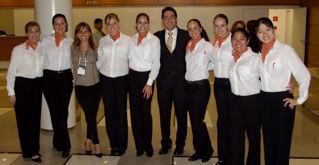Click here if you would like to skip this first part about Talent SpeedReading and go directly to the second part: "How to Do it"
Before exploring how this could be done, we might want to ask what speedreading talents may be good for, or whether it might not be dangerous in some way.
Gallup's research shows that employees are much more engaged when they can do what they do best everyday. Furthermore, more engaged employees lead to several positive outcomes, from higher customer satisfaction to higher shareholder value creation.
My own experience as a manager shows that focusing on your people's talents has a big and fast impact on results. However, I also learned that it is an illusion to believe that you can engage all of your employees or get them enthusiastic about a strengths-based approach, especially in the short run. But even if your strengths-based management efforts are effective with only 33% of your people, that will make a difference!
You can invite a consulting company like Gallup to help you identifying the talents of your people in a systematic way. That may require a considerable financial investment, though. You could also buy a couple of books that give you the StrengthsFinder access code and invite your employees to the Clifton StrengthsFinder online assessment which would (or could) reveal their Top 5 talents.
The problem with both of these approaches, but especially the second one is that your employees may be skeptical about all of this. Conciously or often even unconciously, they may not answer all the questions in the StrengthsFinder survey in the most honest way. They may have a certain "self-image" that they hold dear but that is distorted from their real self. Or they may tend to give "socially desirable" answers. This is a common problem with all personality assessments where people have to answer questions about themselves.
This is where Talent SpeedReading comes in: not only could it save money and time but it can also avoid the "social desirability" problem, if (and this is a big if!) you listen to the judgment of the peers of your talent speedreading "target", and do not form your opinion entirely on your own observations (and biases). Some researchers (click here for source) point out that two raters are consistently more accurate in rating a subject than the subject is him/herself.
So far, I have highlighted the benefits of Talent SpeedReading for employee engagement and in order to avoid the "social desirability" problem common in most self-reported personality or talent assessments. But there are other benefits:
In most organizations, both business and non-business, you need to have quite some political skills to get anything done. An important pillar of such skills is the ability to identify your political allies and adversaries and to "read their minds". You have to know their motives, their strengths and their weaknesses. The ability to speedread their talents (and weaknesses) is certainly most helpful here. The simple concept proposed in part II of this post can provide you with some important insights: is someone strong in Strategic Thinking but poor in Execution, for example? Or is he strong in Relationship Building but not necessarily as strong in Influencing?
And then, Talent SpeedReading is certainly also very helpful when talking with friends and family, and especially when talking about career-related advise.
At last, a word of caution though: I am not sure whether Talent SpeedReading is a good idea for recruiting purposes. It may be better than nothing, but then again, any structured interview is probably better than asking some random questions.
In another post in this blog, I discussed the perils of using the 34 talent themes of the StrengthsFinder for recruiting. In short words: when you recruit, you should look for strengths, not talents. Remember: talents are "raw material" and they may not yet be productive strengths. As a manager, you may not have the time to develop the talents of a new employee into the strengths you need.
So you have to think through the strengths that you really need in the position that you are recruiting for. And this is not an easy task. It is like thinking through the real objectives you have in business or in your own life. They may seem obvious at first, but the more you think about them, the more you may discover how complex they actually can be.
For instance, objectives can be in conflict with each other which may require you to make some tough choices: the personal objectives "financial gain" and "work/life" balance are often at odds, for example. The same is true for strengths: don't get into the trap of looking for superman, full of strengths and with no weaknesses (see the Peter Drucker quote on the column on the right side)!







2 comments:
Speed reading techniques help us to accelerate our reading skill.Also we can improve our memory power by this method.The tips and tricks are necessary for academic as well as in the professional career.
Business writing is a must have skill and lot of people lack on this skill. The live Business Writing seminar help people to gain these skills via expert advice. They definitely are must attend seminars.
Post a Comment